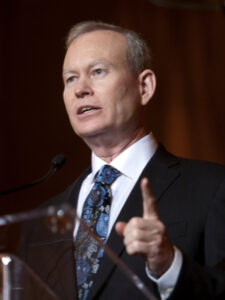
The Urban Land Institute (ULI) is thrilled to announce the appointment of Mick Cornett, former mayor of Oklahoma City, as the ULI Canizaro/Klingbeil Fellow for Urban Development.
Cornett served as mayor of Oklahoma City from 2005 to 2018, leading a major redevelopment plan for the urban core, bringing an NBA franchise to the city, creating an entertainment district that now brings two million visitors a year, and creating 80,000 new jobs. He also served as president of the United States Conference of Mayors and in 2018 was listed among Fortune’s Magazine’s 50 Greatest Leaders in the World. He is also a well-known public speaker and the author of The Next American City.
“ULI’s programs and multidisciplinary members are uniquely equipped to help communities tackle challenges like downtown revitalization, economic development, and connectivity,” said Janice Periquet, president of the ULI Foundation. “It’s thanks to the generosity of our members and their commitment to the built environment that opportunities to engage with leaders like Mick are possible. His rich experience will propel critical conversations that strengthen long-term vitality and improve the health of cities and their people.”
The fellowship was created in 2011 through a generous gift from James D. Klingbeil and Joseph C. Canizaro to advise and collaborate with ULI and its members on issues related to urban development and revitalization. It is part of the ULI Curtis Infrastructure Initiative, which identifies and promotes infrastructure solutions by creating new global and strategic partnerships, providing technical assistance, building capacity at the local level, and investigating innovative and effective strategies and acting as a feedback loop for real estate and land use professionals.
“I’m honored to join ULI in this capacity, eager to support cities of all sizes in enhancing walkability, livability, and affordability,” Cornett said. “While I bring insights from our achievements in Oklahoma City to everything I do, I’ve come to understand that every city is unique—my city is not your city. The real key is building partnerships, fostering leadership that unites everyone toward a common goal, and ensuring local communities have a voice.”
The ULI Fellows program was established in 1996 to enhance ULI’s role in raising awareness of its mission to provide leadership in the responsible use of land and in creating and sustaining thriving communities worldwide. ULI Fellows explore, research, document, and educate ULI members and stakeholders across a global network on topics ranging from real estate finance to urban development policy, retail and entertainment markets to transportation, and attainable housing to decarbonization and resilience.
Klingbeil is founder and CEO emeritus of Klingbeil Capital Management, a multi-faceted national real estate company based in San Francisco. He is one of the original 17 donors, known as Governors, to establish the ULI Foundation in 1970 and has given over $11 million to the ULIF over his lifetime. He previously served as Chair of ULI and ULI Foundation Chair and is now ULI Foundation Chair Emeritus.
Earlier this year, Klingbeil gave $1 million to support ULI’s Advisory Services program. The gift was first announced at a ULI event in Oklahoma City ahead of next year’s 30th anniversary of the bombing of the Alfred P. Murrah Federal Building on April 19, 1995. Klingbeil was the chair of an Advisory Services panel in December of 1995 tasked with offering Oklahoma City hope, and a roadmap to downtown revitalization after the devastating bombing.
Joseph Canizaro is CEO of Corporate Capital, LLC, a ULI Trustee and past Global Chair and was chairman of the Urban Planning Committee of the 17-member Bring New Orleans Back Commission, created by New Orleans Mayor Ray Nagin. Throughout the latter half of the 20th Century, Canizaro developed a large portion of the Class A buildings that make up the New Orleans skyline and is largely credited for his major role in post-Katrina recovery. His vision and heavy hand in bringing together the local, state, and federal government as well as the private sector enabled the comprehensive recovery and rebuilding plan New Orleans needed.

